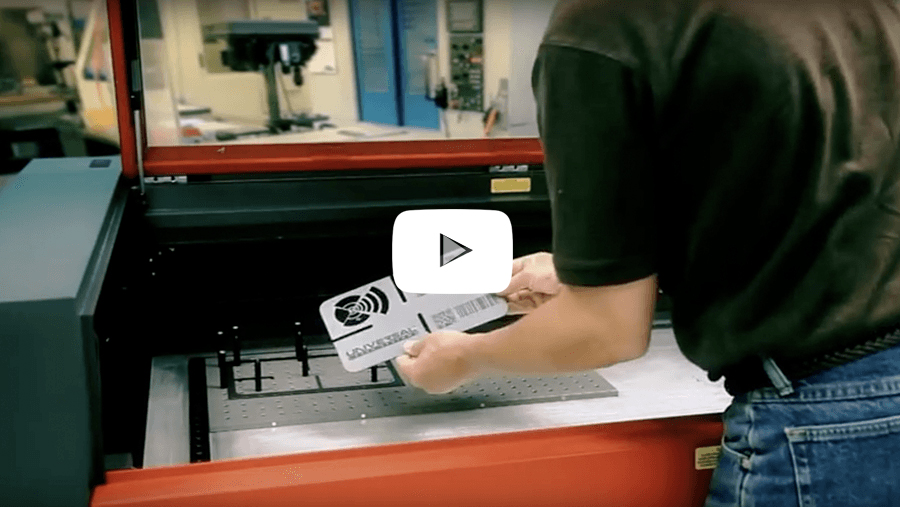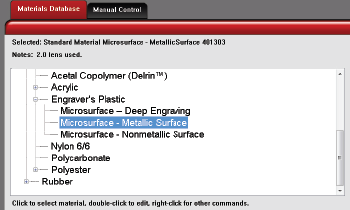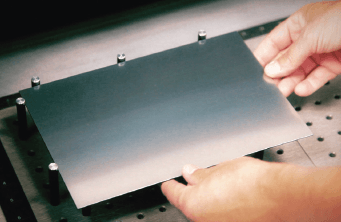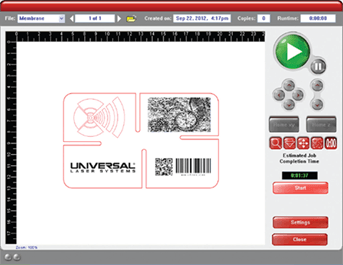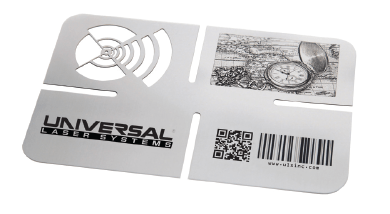DLMP® Technology
Digital Laser Material Processing technology enables users to laser cut, engrave, and mark on almost any material. The capabilities of the unique ULS DLMP® systems expand the potential for applications across organizations and in multiple departments including production, R&D and engineering, sales, marketing and facilities management.
DLMP technology offers various benefits as part of any business solution, such as the following:
Software Controlled
Virtually any design can be printed from your graphic software to the laser system software. Additionally, .DXF and .PDF file formats can be imported directly into the Universal Control Panel (UCP) or Laser System Manager (LSM).
Multi-Material
An endless number of materials are compatible with ULS laser systems, including plastics, metals, silicone rubbers, fabrics, composites, laminating adhesives and other advanced materials to name a few.
Multi-Process
Cut, engrave and mark in one step. Additionally, you can engrave or mark a high-resolution image on material. The laser systems can perform many different types of operations in a single step by seamlessly changing power, speed and other parameters with one click.
Non-Contact
Ablate or modify material without applying any physical force. Using a non-contact method for laser cutting, engraving and marking, the laser system eliminates the need for physical tooling with dies, blades and cutters or permanent holding fixtures.
On Demand
Process material in real time. Laser systems do not depend on physical tooling and are driven by software files. Getting started is as easy as placing the material in the laser system and processing the graphics file.
Extensive Laser Material Processing
DLMP (Digital Laser Material Processing) technology provides an efficient, non-contact method for working with a wide variety of materials. The following list is a small sample of the materials that can be effectively processed with a laser cutting, engraving, and marking machine from ULS using a CO2 and/or fiber lasers. For a complete list of all materials appropriate for laser processing, please see our Materials Library.
- ABS
- Acetal Copolymer (Delrin®)
- Acrylic
- Adhesive Transfer Tape
- Alder Wood
- Alkali-aluminosilicate (Gorilla Glass™)
- Alumamark™
- Alumina
- Aluminum
- Aluminum Silicate
- Anodized Aluminum
- Balsa Wood
- Birch Wood
- Bonding Tapes
- Borosilicate
- Carbon Fiber
- Cherry Wood
- Cotton
- Cork
- Denim
- Felt
- Film with Heat Activated Backing
- FR4/G10 Composite
- Fused Silica Glass
- Graphic Overlay Materials Hastelloy™
- Inconel™
- Iron
- Kapton
- Kevlar
- Laminating Adhesives
- Latex
- Leather
- Maple Wood
- Microsurface Plastic
- Mother of Pearl
- Nylon
- Optical Materials
- Painted Metal
- Paper
- PEEK
- PET Foam
- Photopolymer
- Pine Wood
- Polycarbonate
- Polychloroprene (Neoprene) Polyester
- Polyethylene Foam (Tool Foam™)
- Polyisocyanurate Foam Polyurethane
- Foam
- Powder Coated Metal
- PTFE (Teflon™)
- Silicone Rubber
- Soda Lime Glass
- Stainless Steel
- Stone
- Titanium
- Twill
- Walnut Wood
- Zirconia
How DLMP® Technology Works
To perform a single laser process or multiple processes (in any combination), simply follow these steps:
1
Design Your File
Virtually any graphic or CAD software with a functional print feature can be used, including Adobe® Illustrator®, Adobe® Photoshop®, AutoCAD®, CorelDRAW® and many others.
2
Print or import your file
Print via a Windows driver or import a .PDF or .DXF using the ULS Direct Import software. Imported files can be created in any operating system including Windows® and Mac® OS. Printed or imported files are displayed on the ULS Control Panel. This control panel allows you to preview the file before processing your material.
5
Press Go
Press Go. The laser system processes the material based on the graphic file sent to the ULS control panel software.

